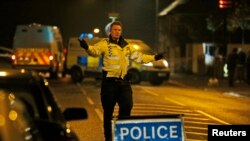The 67-year-old businessman was found dead Saturday at a property in Ascot, a town about 40 kilometers west of London.
Police issued a statement saying that his death is currently being treated as unexplained and that a full inquiry is under way.
Berezovsky had lived in Britain since 2000 after falling out with Russian President Vladimir Putin.
Russia had demanded his extradition on charge of fraud, but the British government refused and granted him political asylum.
Berezovsky had made headlines in recent years over various business deals and legal disputes. Last year he lost a legal battle with Russian businessmen Roman Abramovich, also in London, whom he accused of using threat and intimidation to force him to sell shares in the Russian oil company Sibneft at a fraction of their value.
Last week, news media reported that Berezovsky had begun to sell personal assets to pay debts related to that lawsuit.
Russian broadcaster Russia Today quoted Berezovsky's lawyer Alexander Dobrinovsky, the head of a Moscow-based legal firm, as saying his client may have committed suicide.
Berezovsky, a former mathematician and government official, made his fortune in the post-Soviet Russia of the 1990s.
He profited from gaining control over various assets, including the country's main television channel, Channel One. In 1997, Forbes magazine estimated Berezovsky's wealth at $3 billion.
Berezovsky was at the height of his power during President Boris Yeltsin's years in office, and Berezovsky was made deputy secretary of Russia's security council.
He helped form the Unity party and became a parliament member. Berezovsky was initially a supporter of President Vladimir Putin, but the two clashed soon after Putin's election in 2000. Berezovsky then became a vocal Kremlin critic.
In late 2000, Russian authorities demanded that Berezovsky appear for questioning, but he did not return from abroad. Instead, he moved to Britain, where he was later granted political asylum.
A Russian court convicted him in absentia of economic crimes.
The government took over his television assets and appropriated his other holdings in the country.






